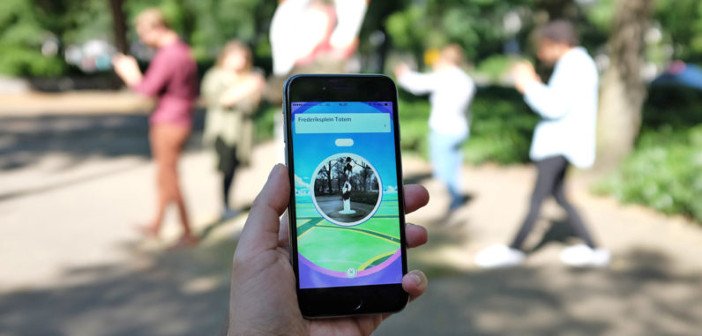Pokémon GO Citizen Science
Unless you’ve been living under a particularly dense and large rock for the last month, you’ve probably heard about Pokémon GO, the augmented-reality mobile game based on the long-running Pokémon franchise. The game was released in early July, and the release was quickly followed by millions of downloads, a troubled global roll-out, a near-constant stream of articles and think-pieces, and an enormous financial boost for both Pokémon’s original company Nintendo and the mobile game’s developer Niantic. Pokémon GO became the biggest mobile game in the world in a matter of days, with over 20 million daily users and many more casual players. It’s a bona fide cultural phenomenon, including the die-hard obsessives, the casual dinner party conversations, and even the alarmist backlash.
And it could have a scientific impact almost as great.
Pokémon GO doesn’t just give you a virtual bag of virtual Pokéballs and tell you to go out there and catch ‘em all for no reason, or suggest that there’s fame or glory or riches awaiting anyone who becomes a Pokémon Master. The premise – the in-game reason for walking around and catching the creatures – is a massive citizen science project.
Citizen science is the idea that non-scientists can make real contributions to scientific research by providing extra pairs of hands and extra pairs of eyes. For example, it would be unfeasible for a single researcher, or even a team of research assistants, to constantly trawl the waters off the coast of British Columbia to log whale movements, but if fishing boat crews, lighthouse operators, ferry and tugboat captains, recreational boaters and coastal residents all agree to log their whale sightings, researchers can use that data. There are citizen science projects operating all over the world, on topics ranging from astrophysics to linguistics to virology, but many of them are this kind of self-reporting ecological project, asking people to report sightings of certain animals or insects.
Which is exactly what people do in Pokémon GO, except with virtual Pokémon instead of real animals. When you begin the game, your mentor is Professor Willow, a Pokémon scientist who comes complete with white lab coat and three ambitious grad students. He asks you to go out and collect data on the Pokémon you encounter, and transfer the data to him at his lab. Willow currently has tens of millions of citizen scientists trawling their neighbourhoods for rare Pokémon, while he can stay in his lab and analyse the data. His three grad students, each working on their own specific project – Pokémon strength, Pokémon evolution and Pokémon eggs – offer you a chance to join one of their teams, based on what you’re interested in. There is literally no in-game difference between the three teams aside from colour, but people are still getting invested in their team leader’s project.

Obviously, the “data” people are collecting in Pokémon GO isn’t useful and isn’t going to a real scientist. But what if real scientists used the Pokémon GO model?
What if real ecological, geoscientific and sociological projects – anything that involves people logging specific data at specific locations – used a Pokémon GO style interface to make it easy and reward people for contributing? The idea of gamification – using the psychological techniques that make video games fun and rewarding to make real world tasks equally enticing – is becoming increasingly popular. Video games are perfecting the art of ongoing external motivation. Just including some kind of “points” triggers people’s engagement; they want to get more points, they want the little rush of being congratulated for getting points, they want to compare the number of points they got with the number their friends got.
Pokémon GO uses Google Maps and your phone’s GPS to track your location. It rewards you for finding new Pokémon, catching Pokémon, and walking long distances as you search. With Google’s permission to use the basics of Maps, and a team able to program a mobile app and manage a citizen science project, there’s nothing to stop Real Life Pokémon GO becoming a reality and engaging a huge number of people in a scientific research project. Imagine an app on your phone that you can log, with location tag, sightings of certain animals in your neighbourhood, and get points and cute avatars as you tag more and provide more accurate data, while knowing you were contributing to real scientific research and possibly ecological conservation efforts. This kind of app could become the new normal for citizen science, and a valuable opportunity to reach a wider audience and collect more data, especially as our capacity to process large amounts of data improves.
Pokémon GO has inadvertently proven that a large-scale citizen science project conducted via mobile app could be very successful. As a generation of scientists raised with mobile phones and video games come of age, the potential for gamification of science projects to lead to much broader engagement with the public could be transformative for science research.
